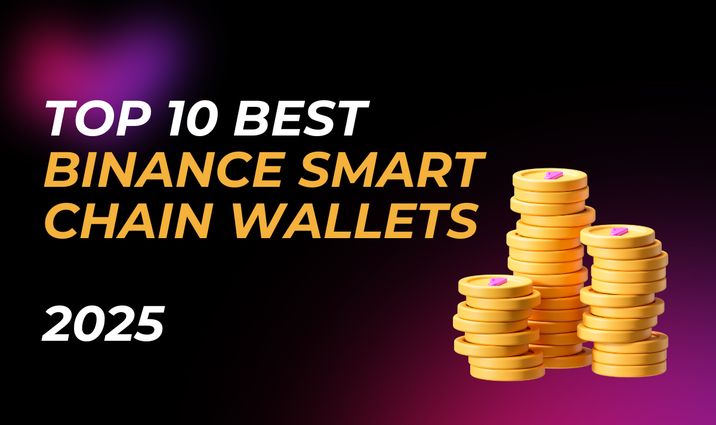Top 10 Best Binance Smart Chain Wallets in 2025

The main challenge for any investor or regular user is choosing a reliable cryptocurrency wallet from the vast number of options available. In this guide, we have compiled the most trustworthy wallets on the market.
A friendly reminder: always keep control of your private keys or passphrases. This is a really important practice for protecting your assets.
1. Coin Wallet
Coin Wallet is a non-custodial, multi-currency wallet that allows users to send, receive, buy, sell, and exchange Binance Smart Chain tokens, as well as other cryptocurrencies. It supports desktop clients for Linux, macOS, and Windows, along with mobile apps for iOS and Android.
When creating a wallet, BIP39 passphrase encryption is enforced by default, enhancing the security of your assets from the start.
2. SafePal S1
This is a hardware wallet backed by Binance Labs. It is fully decentralized, which, according to its owner, ensures a high level of security. It also supports multiple blockchains, including Binance Smart Chain, and features air-gapped security — meaning no Bluetooth, Wi-Fi, or USB connections. If you prioritize extra security and offline protection, this wallet is a solid choice.
3. Trust Wallet
Trust Wallet is a secure, non-custodial cryptocurrency wallet for storing, sending, and receiving digital assets. It supports Binance Smart Chain, over 8 million cryptocurrencies, and more than 70 blockchains. The app is user-friendly, enabling users to buy and sell BNB and other cryptocurrencies via third-party fiat payment providers, swap and stake assets safely, and access Coinbase Pay and Binance Pay. With support for multiple languages, Trust Wallet is trusted by over 60 million users worldwide.
4. MathWallet
MathWallet is a multichain wallet that supports over 90 blockchains, including BSC. It is available as a mobile app, browser extension, and hardware wallet. Security is ensured through multi-signature authentication and mnemonic backups. With its range of options, MathWallet is a versatile choice for users.
5. Zengo
Unlike many other wallets, Zengo utilizes a cryptographic method known as multi-party computation (MPC). This technology enables the creation of a secure key management system without a single point of failure (traditionally, the private key). Instead, multiple parties—such as a remote server and a mobile device—collaborate to perform essential cryptographic functions, including key generation, transaction signing, and verification, without ever revealing their respective secrets.
MPC wallets like Zengo replace the traditional private key with two independently generated mathematical "secret shares." One share is stored on your mobile device, while the other is kept on Zengo's server. Because there is no single point of failure, even if one share is compromised, no one but you can access your crypto.
According to the company, no Zengo wallets have ever been hacked or stolen.
6. Crypto.com Onchain
It is a self-custody multichain wallet. Users of Crypto.com Onchain can leverage their crypto holdings to interact with DeFi products through both a mobile app and a browser extension. It also offers a desktop app that integrates with Ledger hardware wallets. Over 1,000 tokens are supported.
7. Coinbase Wallet
The Coinbase Wallet integrates seamlessly with the Coinbase exchange, making it a great starting point for users who have never used a non-custodial wallet before.
This wallet gives users full control over their assets. Private keys are stored directly on the user's device rather than on Coinbase's servers, enhancing security and protecting funds.
It supports a wide range of cryptocurrencies, including Bitcoin, Ethereum, ERC-20 tokens, and NFTs, allowing users to manage multiple assets in one place. Additionally, it provides seamless access to decentralized applications (DApps) and DeFi services like Uniswap and OpenSea, expanding opportunities for digital asset utilization.
Another key advantage is the ability to import external wallets using a seed phrase, ensuring a smooth and hassle-free transition to Coinbase Wallet.
8. TokenPocket
TokenPocket is a multi-chain decentralized wallet that provides users with a mobile wallet, browser extension, and hardware wallet. It supports various public chains, including Bitcoin, Ethereum, Solana, BNB Smart Chain, TRON, Aptos, Polygon, and all EVM-compatible networks.
TokenPocket generates and stores keys and passwords locally on your device, ensuring that only you can access your account and assets.
An interesting feature of TokenPocket is its physical credit cards, which can be used to purchase cryptocurrency.
9. Сoin98
Coin98 Wallet is a multi-chain wallet that supports a wide range of blockchains and DeFi applications. It was designed for storing, exchanging, and interacting with decentralized services. The wallet is compatible with over 70 blockchains, including Ethereum, BNB Chain, Solana, Polygon, and Avalanche.
It is ideal for users who actively engage with DeFi and NFTs and need a wallet with broad compatibility and seamless asset exchange across different blockchains.
10. MetaMask
MetaMask is the most popular wallet among Ethereum and DeFi users. It provides browser and mobile app access to the decentralized web, allowing millions of users to interact securely. It enables safe browsing, payments, and the sending, spending, and exchanging of digital assets. With MetaMask, users can manage privacy settings, control data sharing, handle Binance Smart Chain transactions, and generate secure passwords.